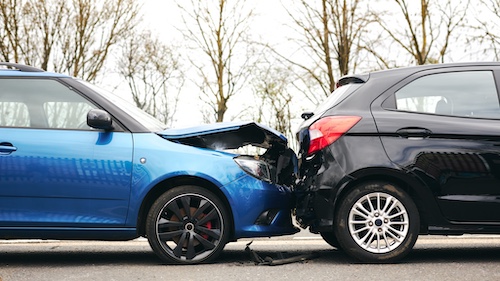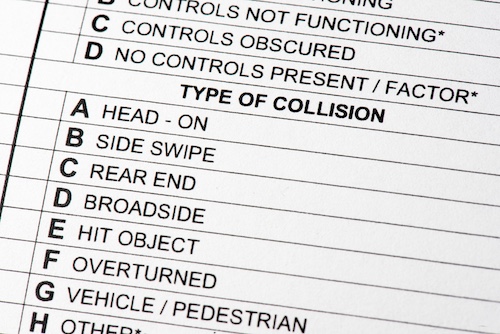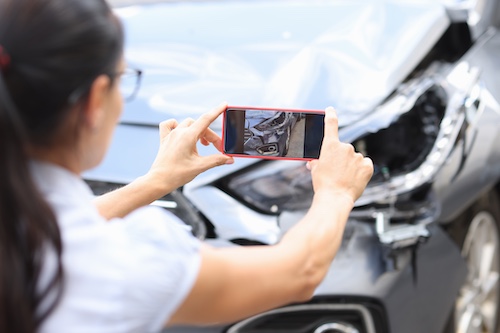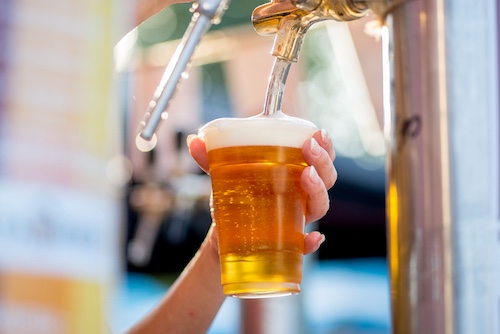Car Accident Scene: What Information You Should Collect?
At GMV Law Group, we are dedicated to protecting the rights of car accident victims across Georgia. Our law offices focus on personal injury cases, and our experienced car accident attorneys work tirelessly to hold negligent drivers accountable and help injured clients recover fair compensation. We understand the stress that follows a collision, and we provide clear guidance, strong legal representation, and a free consultation to every client who turns to us for help.
A car accident scene is often chaotic, but the information you gather in those first moments can shape the outcome of your insurance claim, protect your health, and safeguard your legal rights. Georgia law requires drivers involved in a collision to stop, provide assistance, and share specific details, and failing to do so can lead to severe legal consequences. By focusing on safety, contacting law enforcement, exchanging driver information, documenting the scene, and securing legal representation, you create a strong foundation for recovery and for any personal injury claim that may follow.
In this blog, you will learn the five essential steps to take at a car accident scene, why each detail matters for your safety and legal obligations, and how working with an experienced Atlanta car accident attorney can help protect your rights and strengthen your claim.
Step 1: Ensure Safety and Call for Emergency Help
At a car accident scene, the first priority is safety. Every decision in these early moments can protect lives and reduce the risk of severe legal consequences under Georgia law.
Check for Injuries
Look for serious injuries, visible bleeding, or pain that is immediately apparent. If someone is unconscious or unable to move, keep them still unless there is immediate danger such as fire, heavy traffic, or leaking fuel. Even minor pain can later prove to be a significant bodily injury, so treat every health concern as serious. Check passengers, other drivers involved, and any pedestrians who may have been hit during the collision.
Call 911 Immediately
Call 911 without delay. Tell the dispatcher that an accident happened and give the location, number of vehicles involved, and whether anyone is injured. Request both emergency medical care and a responding police officer. Medical responders can assess injuries on the scene, while law enforcement begins the official police report. This report becomes essential later when filing an insurance claim or pursuing compensation for medical bills and property damage.
Stay at the Scene
Never leave the scene of the accident before law enforcement arrives. Georgia law makes it a serious offense to drive away after a crash involving injuries, death, or vehicle damage (O.C.G.A. § 40-6-270). Drivers involved have a legal obligation to stop, provide reasonable assistance, and remain available for the police officer. Leaving can result in potential penalties such as fines, jail time, or loss of driving privileges. Staying in place shows responsibility and protects your legal rights.
Step 2: Contact Police and Get a Police Report
At a car accident scene, involving law enforcement ensures the incident is properly recorded and legally recognized.
Call for Police Assistance
After checking for injuries, contact the police to report the collision. Tell the dispatcher how many vehicles are involved, whether there are injuries, and the exact location of the crash. A police officer will be sent to the accident scene to manage traffic, speak with drivers involved, and gather facts for the official record.
Importance of the Police Report
The police report is one of the most important documents created after an accident. It records the time the accident happened, the vehicles involved, the names of drivers and witnesses, and the officer’s observations. It may include notes on traffic signs, skid marks, weather, and whether a driver was speeding or failed to stop. This report helps determine fault and is often used in insurance claims and personal injury cases.
Legal Requirement in Georgia
Georgia law requires drivers to notify law enforcement when an accident results in serious injuries, death, or significant vehicle damage. Failing to make this call can lead to severe legal consequences, including criminal charges. Providing accurate information to the officer at the scene protects your rights and prevents disputes with the insurance company.
Step 3: Exchange and Collect Driver Information
At every car accident scene, Georgia law requires drivers involved to stop and share essential information.
Share Required Details
Provide your name, address, and contact information. Give the vehicle registration number and show your driver’s license if requested. Share your insurance company and policy number so the other driver can report the crash to their insurer. These details are required under Georgia law.
Record the Other Driver’s Information
Collect the same information from the other driver. Confirm that the insurance policy is current and note the make, model, and license plate of their vehicle. Write down the driver’s license number. Recording these details at the accident scene protects you when filing an insurance claim or working with a car accident attorney.
Avoid Admitting Fault
Do not discuss fault or speculate on how the accident happened. Simple statements like “I’m sorry” can later be used as evidence of liability. Keep the conversation factual and limited to the exchange of information. Allow the police officer and insurance company to determine fault using the evidence collected at the scene.
Step 4: Document the Accident Scene with Photos and Witnesses
Strong evidence at the car accident scene helps protect your rights and supports both insurance claims and personal injury cases.
Take Photos of the Scene
Use your phone to take clear pictures of the vehicles involved, vehicle damage, and property damage. Capture skid marks, broken glass, traffic signs, stop signs, and road conditions. Photograph the weather, lighting, and traffic at the time the accident happened. If there are serious injuries that are immediately apparent, take careful photos to document them.
Record Details of the Collision
Write down the time, location, and direction each vehicle was traveling. Note any circumstances such as speeding, failing to yield, or ignoring a stop sign. Document how many drivers and passengers were involved. These records help establish fault and clarify the circumstances for both the police report and the insurance company.
Collect Witness Information
Approach witnesses and ask for their names, phone numbers, and contact details. Witnesses often notice details that drivers miss, such as distracted driving or sudden lane changes. Their statements can confirm how the crash happened and provide support for your claim. An experienced car accident attorney will use witness testimony to strengthen a case for compensation.
Step 5: Contact Your Insurance Company and a Car Accident Attorney
After leaving the accident scene, you must report the incident and protect your legal rights.
Notify Your Insurance Company
Call your insurance company as soon as possible. Give the facts of the collision, including the vehicles involved, the drivers involved, and any property damage or bodily injury. Do not speculate about fault or explain how the accident happened. Insurance adjusters use every detail to decide coverage and compensation, so limit your report to what is certain and documented in the police report.
Protect Yourself During the Claims Process
Insurance companies often dispute liability or minimize payouts. They may question the extent of serious injuries or the cost of vehicle damage. Keeping detailed photos, witness contact information, and a copy of the police report will help support your claim. Having this evidence ready ensures you meet your legal obligations and reduces stress during the claims process.
Speak with a Car Accident Attorney
Contact an experienced car accident attorney to guide you through the aftermath. A lawyer can handle communication with the insurance company, assess the value of your personal injury claim, and pursue compensation for medical expenses, lost wages, and pain and suffering. Many law offices offer a free consultation, giving you an opportunity to understand your rights and the potential penalties if legal obligations are not met. Speaking with a car accident lawyer ensures that evidence from the accident scene is preserved and used to strengthen your case.
Protect Your Rights After a Car Accident Scene With an Experienced Car Accident Lawyer!
If you have been injured in a car crash, you do not have to handle the stress and legal consequences by yourself. The insurance company will work to protect its own interests, which is why you need a strong advocate on your side. At GMV Law Group, our experienced car accident attorneys in Atlanta are committed to protecting your rights, building your case with the evidence collected at the accident scene, and pursuing the full compensation you deserve for medical expenses, lost income, and pain and suffering.
Contact us at 404-975-4878 for a free case review today!







